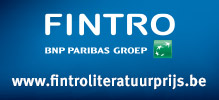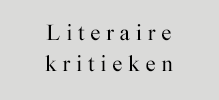Reportages
Op 7 oktober 2017 was het vijf jaar geleden dat Ivo Michiels overleed. Lars Bernaerts en Sigrid Bouset vroegen aan acht auteurs en aan zijn echtgenote om hun geliefde auteur sprekend in leven te houden.
Op zondag 8 oktober om 11 u. werd dit huldenummer van DW B ...
Vaders & Uncles
Soms bedenk ik ingewikkelde spiegeloefeningen die te verfijnd of te vermoeiend zijn om op te voeren. Bijvoorbeeld, ik spreek af met drie schrijvers om samen op stap te gaan in Brussel en we vertellen elkaar hoe onze vier vaders lang geleden in deze stad werkten. We doen dat elk in onze eigen, verschillende moedertaal, maar wij verstaan elkaars talen. Natuurlijk, want wij zijn polyglot en werelds. Gedurende twee of meer dagen tasten wij samen de stad af, en wijzen elkaar aan waar onze vaders werkten. Voor zover we dat weten, want wat weet een zoon of dochter van zijn vader als die ???s ochtends of ???s avonds het huis verlaat? Mijn collega-schrijvers en ik zouden notities maken, ieder in zijn eigen taal. Vervolgens geeft iedereen zijn tekst ???terug??? aan de zoon, en die knipt en plakt die indrukken, weerspiegelingen, fragmenten, misbegrepenheden tot een nieuw portret.
Maar hij ??? de zoon ??? mag geen ????n woord toevoegen aan het portret van zijn eigen vader. Hij is ook verplicht alles te benutten.
Een collage in drie vreemde talen wordt dat, waarbij niemand zijn eigen vaderverhaal mag schrijven, tenzij in dat onhandige geknutsel met anderstalige impressies, schimmen, misverstanden, goedbedoelde flaters. Het was dat wat Claude L??vi-Strauss zei over maskers: ???vluchtige en bijna immateri??le representaties van woorden, visies, geloofsovertuigingen???. Zei ik al dat ik ervan uitga dat de vaders van deze betrokken schrijvers overleden moeten zijn? Dat is opdat de schrijvers, of meer algemeen: de zonen, vrijer zouden kunnen spreken.
Ik hou van muziek die gemaakt wordt op met water gevulde flessen, ik verzamel notities die ik uit papiermanden ontvreemd, ik luister mensen af die fluisteren. Het is dat ik hou van het krampachtige organiseren en mengen van toeval, afval, omwegen, gekunstelde onzin, om zo een genius loci op te roepen. Misschien kan deze oefening bijzonder scherp de talen van een stad tonen in afschijnsels van een vader. Zoals je in een winkelvitrine ??? door het beeld van de straat en afgeprijsde schoenen ??? jezelf kunt zien: verwarrend, zonder focus en ??? ik geef toe ??? zonder veel innerlijke noodzaak. Alsof we willen bewijzen hoe intelligent-meertalig we zijn.
Maar mijn tweede oefening had die innerlijke noodzaak wel. Tom???? was zo oud als ik, maar hij was groter dan ik, Tsjechisch en zwart. Of juister, hij was een donkere mulat. We zaten in de allerlaatste herfstzon van het jaar, net voor de winter hard zou gaan heersen. Op een Brussels terras dronken wij rode wijn en koffie. Wij spraken Engels, Tom???? sprak geen Frans. Tom???? rookte nerveus en vertelde mij over zijn Congolese vader.
When in Autumn 2010 I visited Royal Museum of Central Africa, formerly known as Museum of Congo, I was looking forward to ???infamous??? exhibition, which must have been truly remarkably outrageous. Everyone who wrote about the ???old??? exhibition was highly probably justly upset, troubled, saddened or distressed. Unfortunately for me the old exhibition was gone. I came late by a couple of years. But when I arrived to Brussels I made some observations even before I visited Tervuren. My Belgian friends and colleagues the word Tervuren almost whispered. I am used to the fact that being mixed-raced makes people feel guilty when history of Africa appears as conversation topic, although they have nothing to do with Africa or any particular event at all. Perhaps they didn???t whisper Tervuren, I am exaggerating, but not much. The more sensitive my Belgian friends were, the more awkward they felt. Let me introduce you Isabella. Not her real name, not even one person, perhaps couple of my Belgian colleagues fused together. But consider this, when Isabella ??? I hope the name is working and is distancing you from any ???typical Belgian name??? ???, when Isabella told me that I should visit Tervuren, you knew instantly that something wasn???t right. Of course this museum was on my checklist, but so far I had not the opportunity to tell anybody. But Isabella brought it up in our conversations. When she said: you should perhaps visit Tervuren, her voice, yes it was in her voice, almost broke. Am I exaggerating? No, not really. The sound of her voice was jam-packed with trauma from which she barely recovered. It was not her trauma, but it was also hers, because certainly it was Belgian trauma, trauma of her country. When she talked about Tervuren she expressed all symptoms of intelligent, sensitive human beings which has to tell you really bad news and does that without that Wallonish coquetry. She was still able to maintain a certain reserve. Self-composure perhaps, as if she said it so many times that she almost got used to it. Just there are some feelings still trying to escape, still seeping through. I treasured her vulnerability.
I was disappointed from what I saw. Of course there were some remains of previous colonial pictures of Congo, but not a lot. Some of them unintended and having nothing in common with the exhibition. For example, a small wooden statue of a black servant in Museum restaurant. Grotesque? Or possibly I???m just oversensitive. According to statistics between 1891 and 1911 almost ten million Congolese populations was killed. This is known as Search for Rubber period. Figure is disputed. Some ??? I was told that by Tervuren scholars ??? say that it was ???only??? 15% of population, others that it was 50% of population. The loss of lives was linked to rubber collection. Those who didn???t fulfil the quotas of collection were punished ??? the right hand was cut off. The hands were collected counted and registered, so I don???t know why there is dispute about the figures. It is said that it was the first modern holocaust before the Armenians, before the Jews, dubious honour. I have not the slightest idea where the truth is, but when I saw an old picture of my Congolese grandmother, I was relieved that she had both hands healthy.
Lees meer in BabelGium.


%20the%20invisible%20XXVIII%2c%20100x80%20cm%2c%202014.jpg)



